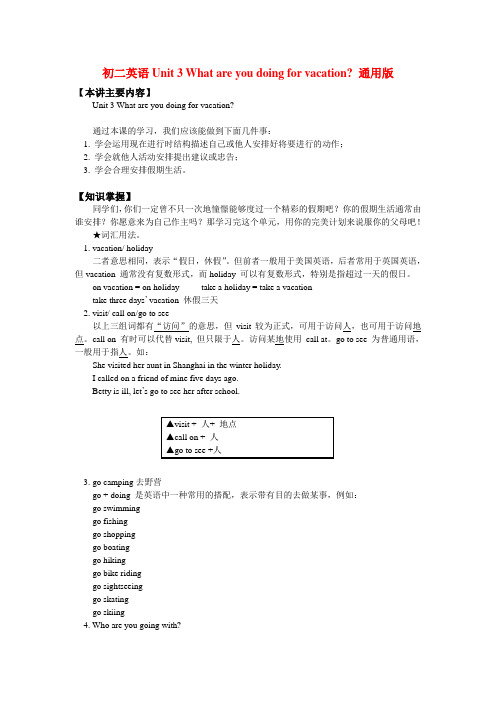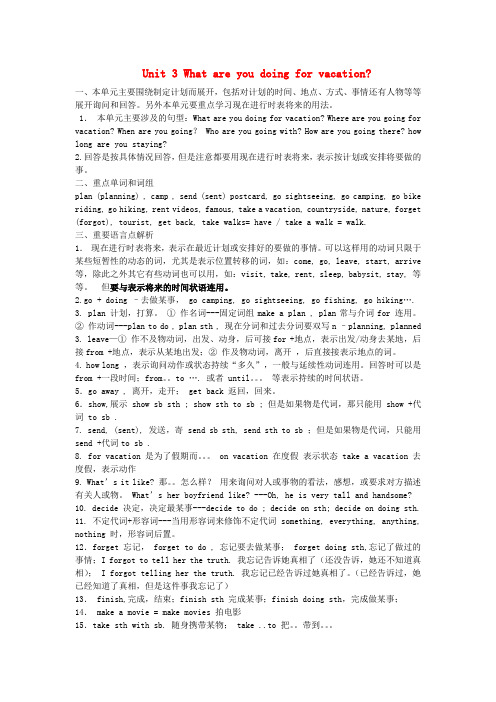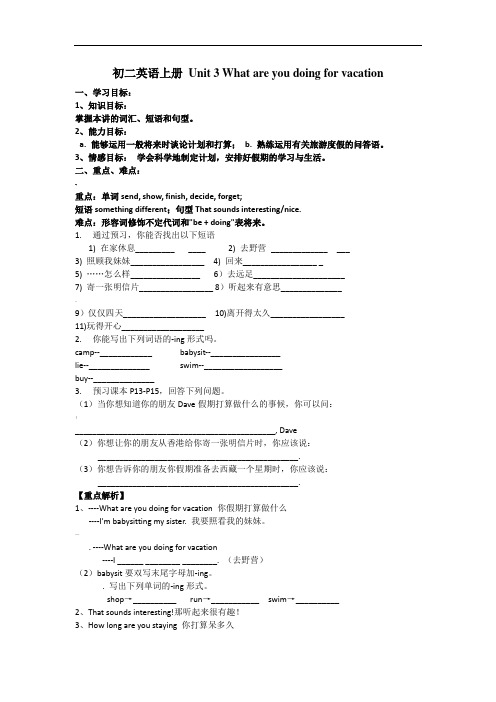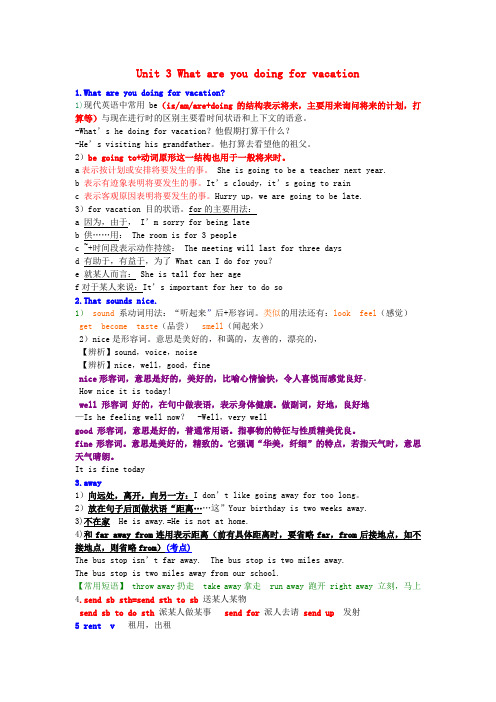FUnit 3 What are you doing for vacation
八年级英语unit 3 what are you doing for vacation 通用版知识精讲

初二英语Unit 3 What are you doing for vacation? 通用版【本讲主要内容】Unit 3 What are you doing for vacation?通过本课的学习,我们应该能做到下面几件事:1. 学会运用现在进行时结构描述自己或他人安排好将要进行的动作;2. 学会就他人活动安排提出建议或忠告;3. 学会合理安排假期生活。
【知识掌握】同学们,你们一定曾不只一次地憧憬能够度过一个精彩的假期吧?你的假期生活通常由谁安排?你愿意来为自己作主吗?那学习完这个单元,用你的完美计划来说服你的父母吧!★词汇用法。
1. vacation/ holiday二者意思相同,表示“假日,休假”。
但前者一般用于美国英语,后者常用于英国英语,但vacation 通常没有复数形式,而holiday 可以有复数形式,特别是指超过一天的假日。
on vacation = on holiday take a holiday = take a vacationtake three days’ vacation 休假三天2. visit/ call on/go to see以上三组词都有“访问”的意思,但visit较为正式,可用于访问人,也可用于访问地点。
call on 有时可以代替visit, 但只限于人。
访问某地使用call at。
go to see 为普通用语,一般用于指人。
如:She visited her aunt in Shanghai in the winter holiday.I called on a friend of mine five days ago.Betty is ill, let’s go to see her after school.3. go camping去野营go + doing 是英语中一种常用的搭配,表示带有目的去做某事,例如:go swimminggo fishinggo shoppinggo boatinggo hikinggo bike ridinggo sightseeinggo skatinggo skiing4. Who are you going with?go是一个不及物动词,在英语中不及物动词不直接带宾语,其后往往有一个介词引导宾语。
八年级英语Unit 3 What are you doing for vacatio1

Unit 3 What are you doing for vacation ?Section A主备人:郝老师使用人:赵王任时间:Learning aims.1. New words:babysit camp plan hike how long away getback send postcard2. Target languages.(1) -- What are you doing for vacation ? ---I;m going camping .(2) —When are you going ? --I,m going on Monday.(3)—How long are you staying ? --We are staying for two weeks.一3、Vacation plan 的制定。
Learning steps.(一)自主学习。
Step 1. 1a&1b.Look at the vacation activities in the picture .Make a list and add a few more .Then listen and number the pictures.写出下列短语:1、照看他的妹妹2、看望堂兄妹3、去野营4、在家休息5、在星期一6、和朋友一起度过Step 2 . Pair work.Ste3. Listening. Listen and finish 2a & 2b.Step 4. Group work. Ask and answer about the vacation plans, then write down. Use “where ……?what ……?who ……with ?”(二)合作探究。
1.Read the conversation of 3a.then fill in the chart .1)send的用法________________2)show的用法__________________ 3)too long中的too 意思是___________4)回到学校_______________ 5)be gong to do与be gong to sp的区别2.Pairwork .3.Writing. Write an article about your dream vacation.三.典题赏析.1.---_____did you tell him about the news ?---By____ an e-mail.A. How ;sendingB. How; sendC. How; sentD. What ;sending 【解析】A。
八年级英语上册 unit 3 what are you doing for vacation重点 人教新目标版

Unit 3 What are you doing for vacation?一、本单元主要围绕制定计划而展开,包括对计划的时间、地点、方式、事情还有人物等等展开询问和回答。
另外本单元要重点学习现在进行时表将来的用法。
1.本单元主要涉及的句型:What are you doing for vacation? Where are you going for vacation? When are you going? Who are you going with? How are you going there? how long are you staying?2.回答是按具体情况回答,但是注意都要用现在进行时表将来,表示按计划或安排将要做的事。
二、重点单词和词组plan (planning) , camp , send (sent) postcard, go sightseeing, go camping, go bike riding, go hiking, rent videos, famous, take a vacation, countryside, nature, forget (forgot), tourist, get back, take walks= have / take a walk = walk.三、重要语言点解析1.现在进行时表将来,表示在最近计划或安排好的要做的事情。
可以这样用的动词只限于某些短暂性的动态的词,尤其是表示位置转移的词,如:come, go, leave, start, arrive 等,除此之外其它有些动词也可以用,如:visit, take, rent, sleep, babysit, stay, 等等。
但要与表示将来的时间状语连用。
2.go + doing –去做某事,go camping, go sightseeing, go fishing, go hiking….3. plan 计划,打算。
学生初二英语上册-Unit-3-What-are-you-doing-for-vacation

初二英语上册Unit 3 What are you doing for vacation一、学习目标:1、知识目标:掌握本讲的词汇、短语和句型。
2、能力目标:a. 能够运用一般将来时谈论计划和打算;b. 熟练运用有关旅游度假的问答语。
3、情感目标:学会科学地制定计划,安排好假期的学习与生活。
二、重点、难点:、重点:单词send, show, finish, decide, forget;短语something different;句型That sounds interesting/nice.难点:形容词修饰不定代词和"be + doing"表将来。
1. 通过预习,你能否找出以下短语1) 在家休息_________ ____ 2) 去野营_____________ ___3) 照顾我妹妹_________________ 4) 回来_________________ _5) ……怎么样________________ 6)去远足_____________________7) 寄一张明信片_________________ 8)听起来有意思______________。
9)仅仅四天___________________ 10)离开得太久_________________11)玩得开心___________________2. 你能写出下列词语的-ing形式吗。
camp--____________ babysit--________________lie--______________ swim--__________________buy--______________3. 预习课本P13-P15,回答下列问题。
(1)当你想知道你的朋友Dave假期打算做什么的事候,你可以问:)______________________________________________, Dave(2)你想让你的朋友从香港给你寄一张明信片时,你应该说:______________________________________________.(3)你想告诉你的朋友你假期准备去西藏一个星期时,你应该说:______________________________________________.【重点解析】1、----What are you doing for vacation 你假期打算做什么----I'm babysitting my sister. 我要照看我的妹妹。
人教版新目标初二上册Unit3Whatareyoudoingforvacation

PPT文档演模板
人教版新目标初二上册 Unit3Whatareyoudoingforvacation
• now
tomorrow
•What’ he doing now? •What’ he doing
tomorrow?
•He is singing.
•He is playing piano.
PPT文档演模板
•What is the bear doing for vacation?
PPT文档演模板
人教版新目标初二上册 Unit3Whatareyoudoingforvacation
PPT文档演模板
•It is cooking a meal .
人教版新目标初二上册 Unit3Whatareyoudoingforvacation
They are going to the beach.
PPT文档演模板
人教版新目标初二上册 Unit3Whatareyoudoingforvacation
•They are going •bike riding.
•Wha
•They are going fishing.
•4)y结尾时,V.+ ing。如carrying、playing、studying •5)ie结尾的动词,ie改y+ing。die→dying lie→lying
•注:现在分词用于现在进行时态,
•
PPT文档演模板
表示正在进行或发生的动作。
人教版新目标初二上册 Unit3Whatareyoudoingforvacation
•辨析句子:
• 1)她正在买东西。
•She is shopping. (be doing)
Unit 3 What are you doing for vacation -

Unit 3 What are you doing for vacation -Unit 3 What are you doing for vacation ?学习目标:在这一单元中,我们要学习如何谈论假期的计划(Vacation plans),对将来的安排(Future plans)语言目标:1. 用现在进行时表示将来。
(Present progressive as future)2. 用where , when , what , how long 提问的句子。
主要句型:1. What are you doing for vacation ? I’m spending time with my friends .2. When are you going ? I’m going next week .3. How long are you staying ? We’re staying for two weeks .教学步骤:Step 1. National Day is coming . We all have a long vacation about 7 days . What are you doing for vacation ? Now Let’s talk about future plans .在这里,我们用到What are you doing for vacation ?同学们可能会奇怪,“be doing”结构不是现在进行时吗?在这一单元中,用现在进行时代表将要发生的动作,表示对未来的计划和安排,译为“我将要…”,“我打算…”。
eg . What’s she doing for vacation ? 她假期要做什么?She’s babysitting her sister . 她要看她妹妹。
这是我们进入初中以来第一次接触到将来时。
这种用现在进行时表示将来动作的用法,实际上在英语中是很常见的。
Unit 3 What are you doing for vacation-20181001173

Unit 3 What are you doing for vacation?第一课时Section A(1a~2c)【课前热身】凡事预则立,不预则废……汉译英。
1.临时照顾某人的妹妹2.看望奶奶3.去海滩4.呆在家里5.去野营6.和朋友们共度时光【消化课本】千里之行,始于足下……1.-What’s she doing for vacation?-s he’s babysitting her sister.-放假期间她要做什么?-她要照顾她的妹妹。
现在进行时除表示正在进行的动作外,还可以表示将来时。
现在进行时表将来时常有“意图”、“安排”或“打算”等含义,是比较生动的一种表达,给人一种期待感。
它的构成和现在进行时一样,都为be+V-ing。
例:①I'm going;我要走了。
②When are you starting?你什么时候动身?③I'm meeting you after class.课后我找你。
④What are you doing next sunday?下星期你打算干什么?⑤When I grow up,I'm joining the army.我长大了要参军。
※表将来的现在进行时有时含有“决心”的意思,多用在否定结构中。
例:①I'm not going.我不走了。
②I'm not waiting any longer.我不再等了。
同步练习翻译下列句子。
1.-假期你要做什么?-我要去露营。
-What you ?-.2.-你要和谁一起去?-我要和父母一起去。
-Who you ?-my parents.2.vacation与holiday的比较。
vacation n.假期。
一般表示比较长的假期。
常用的词组有:on vacation/for vacation(在度假)、the summer vacation(暑假)、take a vacation(休假)。
Unit3 What are you doing for vacation(教案)

Unit3 What are you doing for vacation?Period 1 (词汇教学)Teaching aimsⅠ.Knowledge aimsStudy some new words and phrases:plan, go camping, go hiking, go fishing, go bike riding, visit grandmother, relax at home, spend time with friends, send, postcard, show, go away, get backLanguage structure1.What are you doing for vacation?2.Where are you going for vacation?3.When are you going?4.Who are you going with?5.How long are you staying?Ⅱ. Ability aims1.Learn to use some words and phrases to talk about something.2.Learn to understand the real meaning of new words and phrases.3.Learn to talk about dream vacation using new words and phrases.Teaching importance and difficulties:4.Explain the new words or phrases with their own words.5.Spell the new words and phrases.Teaching aidsCAI,recorder, exercise paperTeaching proceduresStep1. Warming up1.Daily greeting2.Talk about vacation: Do you like vacation? What do you think of vacation? What can you doduring your vacation?3.Brainstorming: Let’s brainstorm about some vacation activities.Step2. Presentation1.Teach some new words and phrases using pictures.a. Look and say other activitiesbabysitting --- looking after babies or little kidsvisiting--- going to see sb.What do you often do to relax at home?spending time with friends---staying with friends for some timeDo you often spend time with your friends? Look and matchb. If you go camping, what do you need?If you go bike riding, what do you need?Where can you go camping and go hiking?Where can you go fishing?C. Teach some new words about placesIf you go on vacation,Where would you like to go?Here are some places, what places are they?Where is Tibet? Is it in China? Where is Hong Kong? Is it in China? It’s a good place to go shopping. Is San Francisco in China? It’s a big city in America. Where is Hawaii? Is it a city? It’s a beautiful place with beautiful beaches.If you go on vacation, where are you going for vacation?Step3 National Day VacationA. October 1st is coming. What day is coming? Yes. National Day is coming. I have aplan.( Show a picture of Shanghai World Expo)I’m visiting Shanghai World Expo. I’m staying there for four days.What are you doing for vacation? How long are you staying?Ss: …B. Guess what their vacation plans are.1.Mary is ____________ her little brother, a six-month-old baby.Because her parents are busy .2. Tom and his friends want to go _________.They have to take a tent(帐篷), and some other things.3. Jeff is bike ________ for vacation. It’s not only fun but also good for his health.4. Lily is going _______ in the mountains for vacation with her family.Walking is good for health.5. Bill is going ________ with his grandfather near the river(河流).6. Jim is tired and he is _________ at home.7. Judy is _________ her grandparents. They live in ______________, a city in America.8. Nancy is going to ______________for shopping.It’s a place called “Shopping Paradise”(购物天堂).9. Sally is __________ time with her friends, who are in ______,a beautiful place in the west(西部) of China.10. Nick is going to the fantastic beach in ________, a place of America.Step 4. 1b, 1c, 3cA. !b Look at the pictures . What activities can you see?What are they doing for vacation? Listen and number the picture.C. 3a What about Tony and Lin Hui ?a. Listen and fill in the table about their vacation plan..b. Read and answer some questions.1. Why is Tony staying there just for four days?2. What does Lin Hui ask Tony to do?3. What does Tony ask Lin Hui to do?c. 1) Guess the meaning of “send” and “postcard”2)Match these phrases and words( )show( )go away( )get backa. go out for some timeb. let sb. see sth.e. come backStep5 Talk about My Dream Vacation1.My dream vacation.On National Day, I am ___________ for vacation with my friends. I’m going to Shanghai. I__________ Shanghai World Expo. I__________ for four days. I __________a ________ to my mother from Shanghai. I’m telling her something interesting aboutShanghai World Expo. After I ________, I ___________ my photos to my friends. What a great vacation!It’s your turn to talk about your dream vacation. Please share your dream vacation in pairs.If I have a vacation, I’m going to ____with my _______. I’m_______ . I’m going there________. I’m staying there for _______….For example:I have a vacation, I’m going to Tibet with my friends. I’m going hiking in the mountains. I’mgoing there on National Day. I’m staying there for a week…⏹Enjoy your vacation!⏹Enjoy your life!⏹Make your day meaningful!Homework:●ReadingSummer vacations are the best time of the year for most children in the world. The weather is usually good. So one can ______ most of his time playing outside. If one lives in the country, he is going __________ or _________ in the mountains. If one lives near the rivers or seaside, he is going___________ or ________ in the rivers or the sea. If one lives in a big town or city, he can usually go to the park to ______. Some children have special vacations. They spend their time helping others, like ____________ little kids and _________ the Old People’s Home. The feeling of helping others make them happier.2. Read the passage again and find out the main idea of this passage.3. Discuss: what kind of vacation is more interesting? Why?●Writing :Write down your dream vacation.●Spend a meaningful vacation during National Day.Blackboard Writing:Unit3 What are you doing for vacation?Period1(词汇教学)What are you doing for vacation? planI’m going camping/bike riding/hiking/fishing. go away babysitting sendvisiting…postcard relaxing at home showspending time with…get back Where are you going for vacation?I’m going to San Franciso/ Hong Kong/ Tibet/ Hawaii…When are you going?Who are you going with?How long are you staying there?。
八年级英语上册 unit 3 what are you doing for vacation知识点总结 人教新目标版

Unit 3 What are you doing for vacation1.What are you doing for vacation?1)现代英语中常用be(is/am/are+doing的结构表示将来,主要用来询问将来的计划,打算等)与现在进行时的区别主要看时间状语和上下文的语意。
-What’s he doing for vacation?他假期打算干什么?-He’s visiting his grandfather。
他打算去看望他的祖父。
2)be going to+动词原形这一结构也用于一般将来时。
a表示按计划或安排将要发生的事。
She is going to be a teacher next year.b 表示有迹象表明将要发生的事。
It’s cloudy,it’s going to rainc 表示客观原因表明将要发生的事。
Hurry up,we are going to be late.3)for vacation 目的状语。
for的主要用法:a 因为,由于,I’m sorry for being lateb 供……用: The room is for 3 peoplec ~+时间段表示动作持续: The meeting will last for three daysd 有助于,有益于,为了 What can I do for you?e 就某人而言: She is tall for her agef对于某人来说:It’s important for her to do so2.That sounds nice.1)sound系动词用法:“听起来”后+形容词。
类似的用法还有:look feel(感觉)get become taste(品尝) smell(闻起来)2)nice是形容词。
意思是美好的,和蔼的,友善的,漂亮的,【辨析】sound,voice,noise【辨析】nice,well,good,finenice形容词,意思是好的,美好的,比喻心情愉快,令人喜悦而感觉良好。
八年级讲义Unit 3 What are you doing for vacation

Unit 3 What are you doing for vacation?重点语法:用现在进行时态表示一般将来时态强调某个动作已经计划好即将按照计划去执行例句:A: What are you doing for vacation, Lin Hui?(林辉,放假准备干什么呢?) B: I'm going to Tibet for a week.(我要去西藏旅游一周。
)A: That sounds interesting!(这听起来很有趣。
)What are you doing there?(你去那里准备干些什么事?)B: I'm going hiking in the mountains.(我准备上山徒步旅行。
)How about you, Tony?(你呢,托尼?)What are you doing for vacation?(你放假准备干些什么呢?) A: I'm visiting my friend in Hong Kong.(我要去拜访我在香港的朋友。
)B: Oh yeah?(是吗?)How long are you staying?(你要去多久啊?)A: Just for four days.(只去四天。
)I don't like going away for too long.(我不想远走太长时间。
)B: Well, have a good time!(祝你旅途愉快!)Send me a postcard from Hong Kong!(记得从香港寄一张明信片回来!)A: Sure. Show me your photos when we get back to school.(当然。
当我们再回学校的时候,再看看你的照片。
)重点短语:how long 多久get back = come back 回来take a vacation = have a vacation 去度假a lot = very much 很;非常be going to do sth. 将要去做某事sound + adj. 听起来(加形容词)sound like + n. 听起来像(加名词)have a good time = have fun = enjoy oneself 玩得愉快show sb. sth. = show sth. to sb. 把某物给某人看want to do sth. = would like to do sth. 想要做某事plan to do sth. 计划做某事pend sometime [in] doing sth. 花时间做某事need to do sth. 需要做某事ask sb. about sth. 询问某人某方面的事情go shopping 去购物leave for 离开去某地听力测试略。
- 1、下载文档前请自行甄别文档内容的完整性,平台不提供额外的编辑、内容补充、找答案等附加服务。
- 2、"仅部分预览"的文档,不可在线预览部分如存在完整性等问题,可反馈申请退款(可完整预览的文档不适用该条件!)。
- 3、如文档侵犯您的权益,请联系客服反馈,我们会尽快为您处理(人工客服工作时间:9:00-18:30)。
Unit 3 What are you doing for vacation?Period 1课后反思:本课在设计上听说结合,相得益彰。
首先给学生创造了一个语言环境,让学生自然融入,然后,缓缓导入阶梯状任务链,循序渐进,难度不断加大,但坡度平缓,铺垫充分且扎实,因此学生在完成最后的中心任务时亦不觉吃力,整堂课学生活动充分,教师的引导点到为止,给学生较大的空间发挥和创造。
另外,教师在几个任务之间的点评也很及时到位,给学生非常清晰的范例和指示,利于学生明确任务的方向。
Unit 3 What are you doing for vacation?Period 2课后反思:学生是活动的主体,课堂上大部分的时间交给学生,教师的引导是关键。
如何一层层的导入,由易至难的阶梯状任务何时引入,如何引入都是关键所在。
同时要注意的是,学生活动之前的范例一定要明确清晰,要每个孩子都知道做什么和怎么做,活动才会顺利的开展,学生才能在活动中有所得。
在课堂设计上体现了任务型教学的主导思想,以任务贯穿教师教学和学生活动的各个环节。
学生活动的目的明确,每个步骤教师都给出了活动所需的语言知识内容,学生亦能准确的使用目标语言,在活动中学习掌握知识。
Unit 3 What are you doing for vacation?设计思路和课后反思:本课从课本入手,用课本内容引出课外活动,层次清晰。
首先面向全体学生进行简单的复习,目的在于巩固几个基本句型。
然后把课本中阅读的短文用听力的方式引入,别出心裁。
其主要目的在于营造较轻松的语言环境,缓解部分学生对于读写的畏惧心理。
接下来,从听说引入读写,给学生铺垫知识的过程。
读写并不脱离听说,因为语言是交流的工具,因此,在读的过程中适当穿插说,既练习口头表达,又巩固了读的成效。
最后,本课的中心任务自然引出,要学生为短文的主人公安排到北京旅游的日程。
整个课堂设计由浅入深,循序渐进,难度过渡非常自然。
学生是活动的主体,课堂上大部分的时间交给学生,教师的引导是关键。
如何一层层的导入,由易至难的阶梯状任务何时引入,如何引入都是关键所在。
同时要注意的是,学生活动之前的范例一定要明确清晰,要每个孩子都知道做什么和怎么做,活动才会顺利的开展,学生才能在活动中有所得。
在课堂设计上体现了任务型教学的主导思想,以任务贯穿教师教学和学生活动的各个环节。
学生活动的目的明确,每个步骤教师都给出了活动所需的语言知识内容,学生亦能准确的使用目标语言,在活动中学习掌握知识。
Unit 4 How do you get to school?教学反思通过了解别国学生如何上学,为下一节课做好准备,拉近中外之间距离,是同学们放眼全球,扩大视野,况且读书上网查资料,这本身就是一种自我提高,自我超越。
还有一点就是关于英语教学的评价。
我们都知道,教学的目的不仅仅交给学生知识,而且也要教给他们用所学知识解决问题的能力和技能。
为了检查教学活动的效果,交给他们学习策略,并引导他们成为独立的学习者,我们不仅要进行总结性评价,而且要进行形成性评价。
通过恰当的评价,来反思自我,提高自我,才能教的生动,学的主动。
Unit 11 could you please clean your room?Period 1教学反思:本课是Unit 11的第一课时。
其主目标是能用“Could you please do things?” “Could I please do things?”谈论如何委婉地提出请求或征求别人的许可, 及回答语“Sure / Certainly / I’m glad to .”能礼貌地拒绝,“Sorry, I / you can’t,. I / you have to do…”并表达自己的理由, 陈述自己的好恶。
以do housework 和调查做力能所及的事为话题,学会运用“Could you please do things?”“Could I please do things?”是本课的语言目标。
本节课主要谈论家务,话题贴近生活,,,在热身阶段, 以灰姑娘的动画片段导入动词词组,猜图游戏使词汇得到巩固,为下面的活动做好铺垫。
新词汇结合学生的生活实际, 掌握运用target language礼貌提出请求, 并使学生受到爱劳动的教育..是本课的重点.。
Unit 11 could you please clean your room? Period 2 教学内容Section A 2a-4一、教学目标1.词汇:stay out late, work on the computer, get a ride,use the car, go to a meeting, hate to do /dong sth2.句型:---Could I please go to the movies?---Yes, you can.---Could I please use the computer?--- No, you can’t. You must do the dishes at first.三.单元重点和难点1.重点。
1)学习和复习一些常用的动词短语。
2)委婉地提出请求、征求许可做某事。
---Could I please use your computer?---Sorry, you can’t..---Could I please watch TV?---Yes, you can. But you have to clean your room first..3)学习如何请求他人的帮助。
2.难点。
1)表达看法:I like doing dishes because it’s relaxing, but I hate to do…because it’s boring.2)区别make与do的用法教学反思本课以游戏导入,复习提出请求的句型Could you please …? 谈论喜欢和不喜欢的家务,从听的活动自然过渡到本课的target language “Could I ..? ”,接着,通过填空方式引入本课一个知识点.最后通过做调查,巩固句型I like … because…以及I don’t like … because…,锻炼学生动手动脑的能力。
Unit 11 could you please clean your room?Period 3一、教学内容Section B 1a-2c二、教学目标1.词汇invite my friends to …,buy some drinks and ,snacks, borrow some money r, teenager disagree2.掌握句型.---Could you please buy some drink and snacks?---Sure. / Yes, I can.--- Could I borrow your money? ---Yes, you can.. Sorry, you can’t.3.难点; 综合的运用单元的目标语针对实际情景解决问题.教学反思如何激发学生的兴趣, 使他们主动积极地参与活动,开展合作学习, 使课堂充满活力,使设计的每个任务产生实效, 这是任务型教学中的首要问题. 本节课开展小组竞赛, 任务链为:游戏热身( 巩固词汇), 讨论(学习运用句型), 表演(综合运用)等活动, 逐步递进, 从简到难, 从谈论Sally 的周末, 到谈自己一周里所干的家务,电话邀请和请求帮助,都是来自现实生活的话题, 极具真实性. 为学生综合表达提供了丰富的素材.让学深入、让学生参与过程的评价体现了以学生为主体的原则.Unit 11 could you please clean your room?Period 4一、教学内容Section B 3a –3c & self check二、教学目标1.学习词汇take care of, forget to do, feed the dog, move to a new house, takethe dog for a walk2.学习写留言条获得朋友的帮助。
.3.难点; 综合运用单元目标语,针对实际情景解决问题.三、教学准备复习词汇和句型.教学反思本节课在复习单元词汇和句型的基础上, 进一步学会运用目标语进行写的训练, 是能力目标的体现. 不同的话题拓展到生活的各个方面, ,给学生综合运用目标语,提供了一个广阔的平台, 使学生能运用语言知识解决实际问题.Unit 11 could you please clean your room?教案示例教学目标:1.学习谈论家务2.提出请求;申请许可3.能够口头或书面描述日常活动情感目标:培养学生热爱劳动,帮助他人的传统美德。
教学重点和难点:1."Could " for polite requests2."Could" for permission.3."Make" versus "do"课前准备:1.教学器材:Recorder; tape, computer, pictures, a courseware, handout, etc.2.教学课件:Cartoon pictures; Flash on PC教学设计:教学过程设计:Task One: Talk about choresGoal:Learn the expressions of daily chores by means of discussionStep 1.Brainstorm: What chores do you have at home? Who often does the chores?How often do your family do them? (Ask a few students to answer the question orally.)Step 2.Do you do these chores at home: Section A: 1aStep 3.Help the students form the groups of three people and make sure one is the kid, the other two are mother and father.Step 4.Ask the "kid" in each group to fill in the chart according to the real situation in his or her home.Step 5.Is it fair for everyone in the family? Try to role-play the discussion in groups.E.g.Kid: Could you please cook twice a week, dad? Mom is too tired.She needs help.Father: Sure.But could you wash your own clothes?Kid: Sorry, I can't.I don't have too much time.Task Two: Make polite requests and ask for permissionGoal: Learn the structures of making requests and asking for permission by means of listeningStep 1.Brainstorm: What kind of difficulties will a person, who is hurt at school?(Write the students' ideas on the board)Step 2.Listen to the tape, trying to follow the structures in it: Section A: 1b; 2a & 2bStep 3.Ask a student to pretend Jack who was hurt, and tell him to ask for helps from his classmates in the front.The rest of the class try to give him different answers.E.g.--- Maria, could you please move the chair for me?---Sure, I'd love to.---Annie, could you please help me take English notes?---Sorry, I can't.I have to go to the teacher's office first.I can help you later.Task Three: Express daily chores in short passages by means of talking, reading and writingGoal: Have the ability of expressing daily chores not only orally but also in written EnglishStep 1.Help the students form groups of three.Step 2.Role-play the conversations in groups.Step 3.Present some conversations to the class.E.g.Tom: Could I have an ice cream?Father/Mother: …Tom: Could I take the small plane there?Father/Mother: …Step 4.Learn more expressions of daily chores by reading an e-mail, answer it and try to write a new one: Section B: 3a, 3b &3c.教学点评与反思:一、设计思路:课前讨论为任务一的完成做了铺垫。
